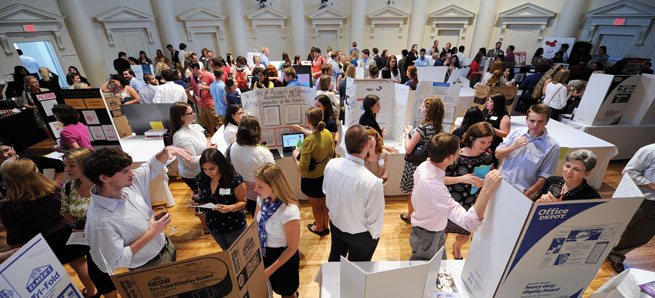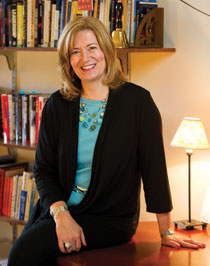
In this increasingly competitive and complex professional environment, organizations are looking for returns on their biggest continuing investment—their workforce. Employees once stayed with the same company for decades, hoping to move from the cubicle farm to a wood-paneled haven. Today’s employees jump jobs, flex their time, work part time, share positions, consult, telecommute and repurpose their careers four times or more. Given these challenges, how does today’s organization recruit, retain, advance and lead the best employees?
In response to these changes, Peabody is changing as well. The new Leadership and Organizational Performance master’s program is a hybrid, taking what worked best from its predecessors and adding new areas to position the program for the 21st century. The program, which enrolled its first students in fall 2011, is focused on developing managers and leaders who promote talent development, employee engagement and organizational performance. The LOP program, building on the solid foundation provided by the Human Resource Development and Organizational Leadership programs, takes the field into the next generation.

“Focus is changing from leadership to performance—as in how is the company performing? How do we know if a new idea is working? What part do employees play in that? How do we measure performance?”
—Dayle Savage
Leading the program is Dayle A. Savage, EdD’05. Savage joined the Peabody faculty after receiving her education doctorate and is assistant professor of the practice of leadership and organizations. She developed and launched the highly successful Peabody Office of Career Development in 2005 and continues to research organizational change and leadership development, particularly as it relates to talent management and human capital. “Learning and performance go hand in hand,” she says.
Savage is a perfect example of today’s employee. After earning a degree in music education, she taught high school choral music for four years, was an employment counselor for five years, the HR director and administrator of a large law firm for more than a decade and then developed her own consulting practice before earning her doctorate. Savage has had a successful consulting practice in industries including health care, technology, education, nonprofit, entertainment and professional service organizations. She is also a professional coach.
“I’m a practitioner in a research world,” she says. “Many of the professors in our programs had practical experiences before they came to academia.” Joining Savage on the LOP faculty are John Bachmann, Mark Cannon, Corbette Doyle, Christine Quinn Trank and Deborah Tobey.
The LOP curriculum is grounded in theory from the disciplines of leadership, organization theory, behavior and development, learning, analytics and strategy. “The classes take known theory and apply that theory to practice,” Savage says.
“At the program’s core is new knowledge about leadership and organizational theory. The focus is changing from leadership to performance—as in how is the company performing? How do we know if a new idea is working? What part do employees play in that? How do we measure performance?”
The LOP program attracts students who want to develop and use their leadership abilities in various sectors including for-profit, nonprofit, government, education and NGOs.
The curriculum includes case studies with actual clients, with the focus varying by course. Students may analyze organizational initiatives, a strategic plan for a new market, or programs. They will use their newly learned consultation skills to advise on cases, including marketing, membership development, customer satisfaction and performance standards.
The program also requires an internship with at least 135 hours of contact time at an organization. Savage is able to turn to her extensive network to pull in companies for case studies and internships. Prior projects have included Bridgestone, Nissan, Asurion, the Vanderbilt Medical Group, Trinisys, and the Junior Chamber of Commerce. “This will typically be project work,” Savage explains. “A manager will say ‘Here’s a problem, please fix it.’ ” One of her students developed a change management toolkit during an internship that is saving the company $28 million.
The master’s program can be completed as a traditional master’s, an evening/weekend program or as a fifth-year program for Vanderbilt undergraduates. Savage says the 32 members of the program’s first class ranged from recent graduates to professionals in their mid-30s. The group stays together as a cohort during the program’s first year through the core courses; they will branch out to specialize through electives in the second year.
The program’s goal is for students to build the skills needed to be strong leaders and managers in today’s world in areas such as strategic thinking, managing ambiguity, critical thinking, leading and managing others, innovation and creativity, risk taking, conflict management, negotiation and influence, analytical thinking, intercultural adaptability and learning agility.
Savage expects graduates to move into careers as consultants, human capital analysts, project managers and recruitment or admissions executives. “I believe in this program, the work behind it, and the students,” she says. “People are the most important asset. How people lead and how people learn help define the success of an organization.”